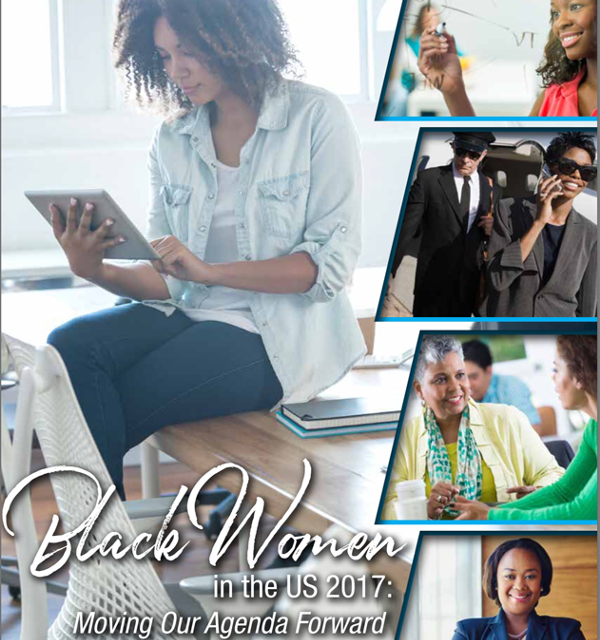By Donna Owens
NBCBlk, MAR 29 2017 —
The Black Women’s Roundtable, a national civic group, released its fourth annual report today about African-American women in the U.S., providing a “prescriptive agenda” of key political, economic, and social issues that impact the nation’s 23 million Black women, their families and communities.
The 72-page document, entitled ‘Black Women in the U.S., 2017: Moving Our Agenda Forward in a Post-Obama Era,’ was released to coincide with the group’s 6th annual “Women of Power” national summit, taking place this week in the nation’s capital and Arlington, Virginia.
The organization’s leadership unveiled the report today at the Washington, D.C. headquarters of the National Coalition on Black Civic Participation (NCBCP), a nonpartisan nonprofit which works around Civil Rights and social justice issues; the group convenes the round-table.
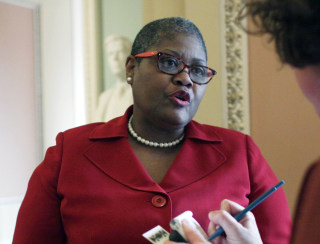
Melanie Campbell, president, National Coalition on Civic Participation, speaks to a reporter on Capitol Hill in Washington, Wednesday, April 15, 2015. Lauren Victoria Burke / AP, file
“The current polarized political climate requires us to find innovative ways to move our public policy agenda forward in our quest to empower Black women and their families to live their best lives,” said Melanie L. Campbell, President/CEO of NCBCP and head of the round-table.
When polled, top issues for Black women include jobs, quality education and affordable healthcare. “We plan to share these findings and recommendations with members of the 115th Congress and the Trump Administration,” she said.
Several hundred participants, who represent an intergenerational mix of black women from regions nationwide, will gather for the confab from Thursday through Sunday. The women and girls attending are community activists, scholars, elected officials, students, labor organizers, public policy experts, entrepreneurs, health professionals and more.
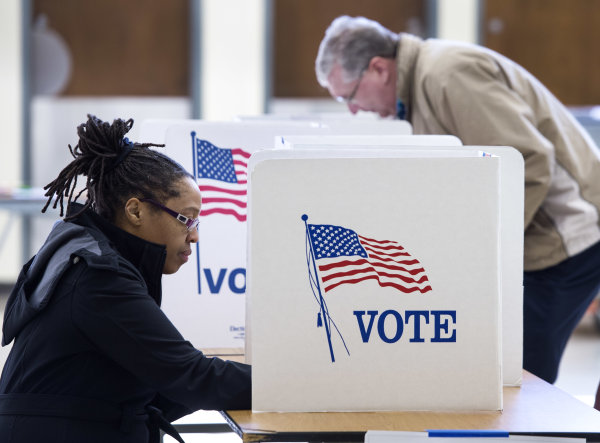
People vote in the Super Tuesday primary at Centreville High School March 1, 2016, in Centreville, Virginia. AFP/Getty Images
Summit organizers have planned a busy itinerary of strategy sessions and events: they include visiting Capitol Hill on Thursday to engage lawmakers and hold a press conference on the budget and Supreme Court; to a Friday panel on black women in the media with leading journalists to be moderated by Essence editor-in-chief, Vanessa DeLuca.
The report—co-authored by multiple contributors described as experts in their respective fields—is designed to serve as a roadmap to frame and promote their public policy agenda with up-to-date research, best practices and organizing strategies.
“[It] provides very concrete answers around the question of where we should go from here, at the dawn of the post-Obama era,” said Avis Jones-DeWeever, Ph.D., the document’s editor-in-chief.
Specifically, the report calls for action such as protecting women’s health care access, expanding access to paid family and medical leave, addressing human trafficking, and expanding Black women’s political power.
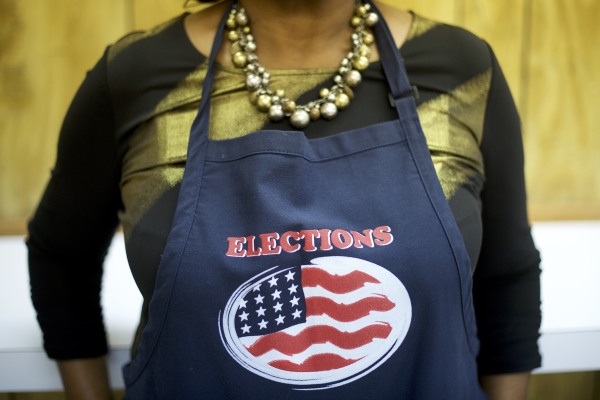
A Poll Clerk wears an election themed apron at the Aimwell Presbyterian Church polling precinct on February 20, 2016 in Walterboro, South Carolina. Mark Makela / Getty Images
Here are some key findings from the report:
Black Women Expanding Political Power
– In both 2008 and 2012, Black women redefined voting history by becoming the largest demographic group to cast ballots in an election. In 2016, Black women continued to vote at high levels and increased their numbers in Congress (from 20 to 21 women); for the first time in nearly two decades, a second Black woman—former California Attorney General, Kamala Harris, was elected U.S. Senator.
– Two of three African Americans elected Mayor in a top 100 city were women, and smaller jurisdictions in Arizona, Arkansas and Florida, each elected their first Black woman mayor.
– Several cities that witnessed high-profile police killings (Orange County, Florida; Chicago, Illinois, and St. Louis, Missouri) elected Black woman prosecutors.
– The state of Texas elected its first Black woman Sheriff, Zena Stephens.
– Jefferson County, Alabama elected nine Black women to the judicial bench.
Black Women/Girls and Human Trafficking
– According to the Justice Department, slightly more than 40% of sex trafficking victims are Black, far outpacing White (25.6%), Hispanic (23.9%), Asian (4.3%) and Other (5.8%) victims.
– Women are more than twice (68 percent) as likely as men (32 percent) to be trafficked for sex.
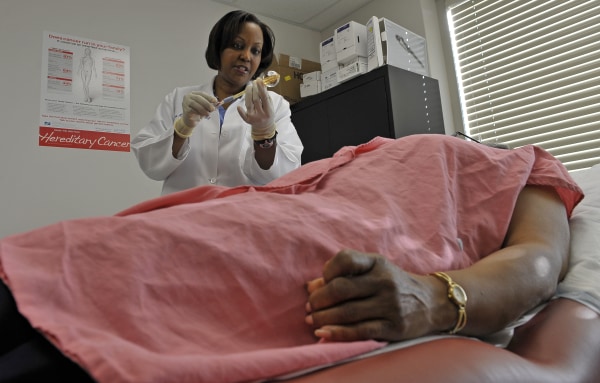
LANHAM, MD- MARCH 15 Dr. Regina Hampton prepares to insert a balloon catheter into a patient’s breast for radiation treatment in Lanham, Maryland on March 15, 2012. Dr. Regina Hampton is a breast surgeon and medical director of Signature Breast Care in Lanham, Maryland. Photos for the Black Women series about breast cancer awareness. (Photo by Marvin Joseph/The Washington Post via Getty Images) Marvin Joseph / The Washington Post/Getty Images
Black Women’s Health
– Black women are still disproportionately impacted as part of the 24 million Americans living in states that did not accept Medicaid expansion under the Affordable Care Act.
– Black women continue to face a wide range of alarming health disparities, including heart disease, breast cancer, HIV, maternal mortality and exposure to violence.
– More than a third of Black women in the workforce still have no access to paid sick days.
Black Girls and Juvenile Justice System
– Black girls are nearly three times more likely than White girls to be referred to the juvenile justice system from other social service agencies such as schools, mental health facilities or the child welfare system.
– They are often accused of committing “technical” violations such as truancy, running away, underage drinking and being “hard to control.” Such violations make up nearly a third (31%) of the offenses that are responsible for Black girls being incarcerated.
Black Women and Higher Education
– Black women earned 67% of Associate Degrees and 65% of Bachelor Degrees earned among Blacks. And while all women across race are more likely to complete higher education than their male counterparts, Black women outpace their male peers by more than any other group.
– Black women though, continue to lag behind when it comes to those enrolled in a major reflective of the STEM Fields (10.6% Black women vs. 19.3% Black men respectively).

Hinterhaus Productions / Getty Images
Black Women and Business
– Black women remain the fastest growing group of entrepreneurs. As of 2016, there were an estimated 1.9 million Black women-owned firms, employing 376,500 workers and generating $51.4 billion in revenues.
– Although for years, Black women have led the nation in business start-ups, breaking into the tech space has typically been significantly more difficult, as the majority of such startups led by Black women receive virtually no venture capital funding.
The average amount of venture capital funds raised by Black women founders is just $36,000. That’s compared to $1.3 million in venture capital funding raised by White men. Fewer than two dozen Black women-led tech startups have raised more than $1 million of billions in tech investment funds.
Reflecting on the report, Jones-DeWeever said “we see this time not as a moment to retreat, but instead as a time to increase our resolve, our focus, and our action on behalf of better futures for ourselves and our families.”
Moving forward, Campbell said the roundtable will continue to push issues such as expanding the political power of Black women by encouraging more women to seek office nationwide; push to hold elected officials accountable for policies that can improve overall health and well-being of Black women—be it resources for combatting sex trafficking or data collection related to education.
The goal, she said, is to increase opportunities and achievement for Black women and girls– thereby boosting positive outcomes for their families, communities and the nation. “We will continue to strategize and organize.”

